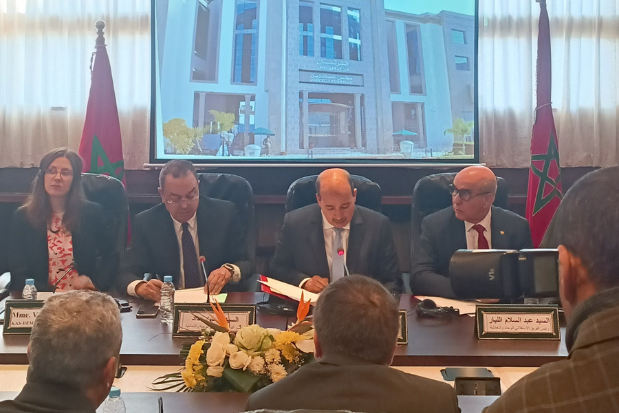Morocco/EU relations: towards new perspectives in the face of climate challenges. The Carbon Border Adjustment Measure (CBAM) and its implications for the Moroccan economy - Regional Programme Energy Security and Climate Change in Middle East and North Africa
Event
Details
Morocco and the European Union have had strong economic and political relations for several decades. However, in the face of current climate challenges, these relationships need to be strengthened and deepened to address environmental challenges. With this in mind, a conference entitled "Morocco / EU relations: towards new perspectives facing climate challenges. The Carbon Border Adjustment Mechanism (CBAM) and its implications on the Moroccan economy" took place on Tuesday, February 7th. The event was jointly organized by KAS REMENA and the Istiqlal group at the second chamber of the Moroccan House of Councillors. The conference brought together policymakers, experts, and representatives of civil society from Morocco.
The conference offered an opportunity to discuss the carbon border adjustment mechanism (CBAM), a measure proposed by the EU as part of its efforts to reduce its greenhouse gas emissions. As a tax that will be applied to products imported into the EU to offset the emissions occurring in the production of these goods, this measure will have significant implications for the Moroccan economy once it enters into force.
In his welcoming speech, the President of the Moroccan House of Councillors, Niama Myara highlighted the importance of the relationship between Morocco and the EU in combating climate change. He reminded the audience that Morocco is committed to implementing ambitious environmental policies, including through the adoption of the national strategy for sustainable development by 2030 and also highlighted Morocco's considerable potential in renewable energy, especially solar and wind power. At the same time, he also pointed to the challenges Morocco faces in this area and the opportunities it can seize to strengthen its energy and environmental transition.
Providing the opening input, David Boublil from the Directorate-General for Taxation and Customs Union in the European Commission explained the current status of the EU’s plans and deliberations for the design of CBAM and its implementation. He also highlighted considerations concerning the effects on partners and available support from EU side in this regard.
During the subsequent interventions, experts from Morocco discussed the implications of the CBAM for the Moroccan economy. They pointed to potential negative effects on Moroccan exports to the EU, particularly in the sectors to be covered by CBAM, namely iron and steel, cement, fertilisers, aluminium, electricity, and hydrogen. However, they also emphasized that the CBAM could offer opportunities for Morocco to strengthen its energy and environmental transition by encouraging investment in renewable energy and reducing greenhouse gas emissions.
The speakers stressed the importance for Morocco to adapt to the CBAM and take measures to reduce greenhouse gas emissions in the affected sectors. They also emphasized the importance of international cooperation in helping Morocco address the challenges of implementing ambitious environmental policies, particularly the transition to renewable energy.
The conference also addressed other issues related to Morocco-EU relations, such as foreign investment and trade policies. The speakers highlighted the importance of promoting foreign investment to strengthen the Moroccan economy and create jobs, but also ensuring that these investments are sustainable and environmentally respectful. Another point raised was the importance of fair and equitable trade policies to ensure that trade between Morocco and the EU benefits both parties equally.
In summary, the conference on Morocco-EU relations and the CBAM highlighted the importance of strengthening cooperation between Morocco and the EU in the fight against climate change and the transition to a green economy. The discussions clearly showed the importance for Morocco to adapt to the CBAM and take measures to reduce greenhouse gas emissions in the affected sectors as well as the necessity to promote sustainable foreign investments in the Moroccan economy. The conclusions and recommendations of the discussions will be the subject of a policy paper currently being prepared.



